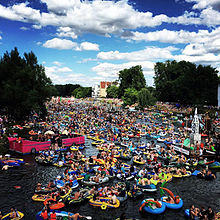Oath Monday

The Oath is a traditional Ulmer festival that every year on the penultimate Monday in July as Schwörtag is committed and the Oath ended.
history
The holiday goes back to the 14th century. At that time, a dispute smoldered between the patricians and the guilds about the balance of power in the city parliament of the Free Imperial City of Ulm. It was not until 1397 that the differences were settled with the so-called Great Oath Letter. This guaranteed all members of parliament equal voting rights and obliged the mayor to give an annual account. The mutual oath of loyalty of the citizenship and city council from the oath balcony of the Ulm oath house It was retained with interruptions into the 19th century. It was only with the loss of independence in 1802 that the new rulers - first the Bavarian and later the Württemberg rulers - stopped.
The oath since 1933 / oath formula
With the appointment of Lord Mayor Friedrich Foerster to office on August 14, 1933, the National Socialists revived the old custom and turned the oath speech into an address to the population in which the Lord Mayor gave an account of the past year and the political, social and economic plans for it introduced the following year. In particular, the National Socialists understood the oath as a pledge of loyalty between “the leader and the followers”.
After the Second World War , the new mayor Robert Scholl , a staunch democrat and father of the resistance fighters Hans and Sophie Scholl , decided not to do the Schwörakt. Scholl's successor, Theodor Pfizer , reintroduced the Schwörakt on August 8, 1949. After the oath speech, the incumbent Lord Mayor has since taken an oath on the great oath letter from 1397, the city constitution. This happens to the sound of the oath bell with the words:
"To be a common man for the rich and the poor in all the same, common and honest things without any reservation."
If the weather is bad, the oath will be relocated to the festively decorated Ulm Minster . In 2007 the oath was broadcast live on the internet for the first time. Due to the COVID-19 pandemic , only 250 guests - 150 of them selected citizens - were able to follow the oath at the Weinhof in 2020. The Nabada was stopped this year by a ban on entering the Danube.
The Nabada
Every four years there is a jousting on the Danube on the two Sundays before the oath Monday . This tradition can already be traced back to the imperial city times, where it took place every two years on the Tuesday after Oath Monday.
In the years between these original fishermen's jousting, the “Bäuerle shutdown” took place instead, a kind of carnival parade on the Danube that ended in Friedrichsau , and which over the years has turned into Nabada ([ ˈnaːbaːdɜ ], Swabian for “down bathing”) developed.
Officially organized for the first time in 1927, participation on the water at Nabada was initially only permitted to the organizing associations. Since the end of the 1960s, so-called free or wild “nabaders” in boats and rafts have also been allowed to participate in the official themed boats.
The Nabada begins on the afternoon of Oath Monday around 4 p.m. Should it have to fail due to bad weather or adverse water conditions, red signal baskets that can be seen from afar are attached to the square wreath of the Ulm Minster. In 2015, Nabada was estimated to have 60,000 visitors.
See also
Individual evidence
- ↑ Wolf-Henning Petershagen: Oath Monday: a phenomenon from Ulm . Süddeutsche Verlags-Gesellschaft, Ulm 1996, ISBN 3-88294-234-7 , p. 35 .
- ^ City of Ulm (ed.): Ceremony in the council chamber on Oath Monday, August 17, 1936.
- ↑ Press release on Oath Monday 2007 ( Memento from August 17, 2007 in the Internet Archive ), City of Ulm, July 17, 2008.
- ↑ Press release on Oath Monday 2020 ( memento from July 19, 2020 in the Internet Archive ), City of Ulm.
- ↑ The Ulm Nabada. City of Ulm, accessed on July 21, 2018 .
- ↑ Tobias Herrmann: What is Nabada? SÜDWEST PRESSE, July 20, 2018, accessed on July 21, 2018 .
- ↑ SWR report on Oath Monday 2015

